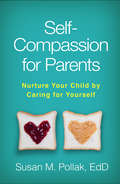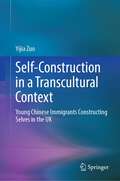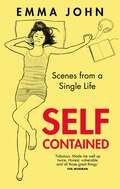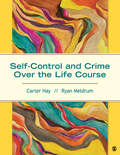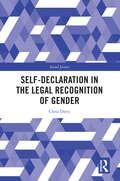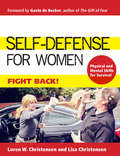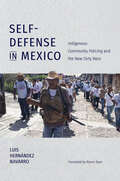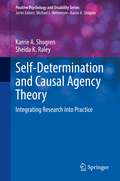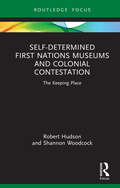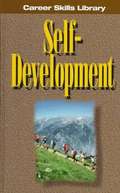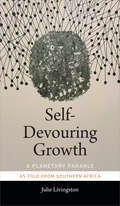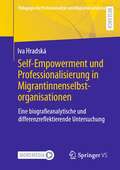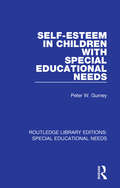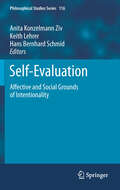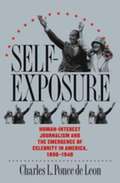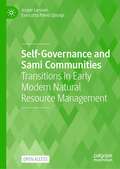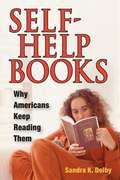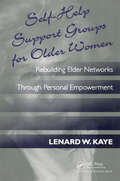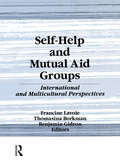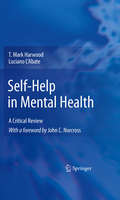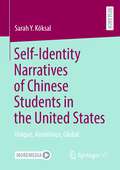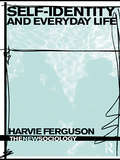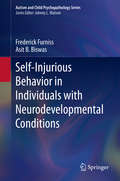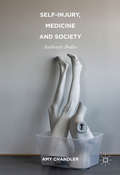- Table View
- List View
Self-Compassion for Parents: Nurture Your Child by Caring for Yourself
by Susan M. Pollak"I yelled at the kids again--and feel so ashamed." "I barely have time to shower, let alone exercise; no wonder I’m so out of shape." "I'm just not the dad I hoped I would be." Parenting is hard. That's why self-compassion is so important. In this empathic resource, mindfulness expert and psychologist Susan M. Pollak helps you let go of constant self-judgment and treat yourself with the same kindness and caring you strive to offer your kids. Simple yet powerful guided meditation techniques (most under three minutes long) are easy to practice while doing the dishes, driving to work, or soothing a fussy baby. Learn to respond to your own imperfections like a supportive friend, not a harsh critic. You will find yourself happier and more energized--and will discover new reserves of patience and appreciation for your kids.
Self-Construction in a Transcultural Context: Young Chinese Immigrants Constructing Selves in the UK
by Yijia ZuoThis book explores the ways in which individuals construct and integrate self-positions in a transcultural context, by adopting a pluralist theoretical and methodological approach that includes both Western post-modern viewpoints and ancient Chinese philosophical ideas.The book starts with stories of two second-generation Chinese young people and their mothers' life experiences in the UK, which can be seen as an epitome of individuals living in the modern and complex environment of the time. Using social constructionist viewpoints, it then analyzes the overt interaction between the individual and outside environment and interprets the recessive interaction, such as the individual’s psychological response to the outside environment, which might be unknown to him or herself, using the psychodynamic approach based on object relations theory and other psychoanalytic concepts, such as defense mechanisms. The book uses Confucian philosophy to show how Chinese people think about the relation between other people and themselves and also integrates different and even opposing theories and viewpoints from Taoist philosophy.This creative book provides a theoretical and practical approach to explore the conception of “self” and the way in which individuals construct their self-positions in a complex context. Combining cutting-edge Western psycho-social viewpoints and ancient Chinese philosophy, it appeals to readers interested in “self,” psycho-social approaches, psychoanalytic viewpoints and Chinese philosophy.
Self-Contained: Scenes from a single life
by Emma JohnThere is a piece of cod-wisdom regularly dispensed to single women: romance will arrive when you least expect it. I had assumed it would also make its own travel arrangements too. Emma John is in her 40s; she is neither married, nor partnered, with child or planning to be.In her hilarious and unflinching memoir, Self Contained, she asks why the world only views a woman as complete when she is no longer a single figure and addresses what it means to be alone when everyone else isn't.In her book, she captures what it is to be single in your forties, from sharing a twin room with someone you've never met on a group holiday (because the couples have all the doubles with ensuite) to coming to the realisation that maybe your singleness isn't a temporary arrangement, that maybe you aren't pre-married at all, and in fact you are self-contained.The book is an exploration of being lifelong single and what happens if you don't meet the right person, don't settle down with the wrong person and realise the biggest commitment is to yourself.
Self-Control and Crime Over the Life Course: Lilly: Criminological Theory 6e + Hay: Self-control And Crime Over The Life Course
by Carter H. Hay Ryan C. MeldrumWhat exactly is self-control, and what life outcomes does it affect? What causes a person to have high or low self-control to begin with? What effect does self-control have on crime and other harmful behavior? Using a clear, conversational writing style, Self-Control and Crime Over the Life Course answers critical questions about self-control and its importance for understanding criminal behavior. Authors Carter Hay and Ryan Meldrum use intuitive examples to draw attention to the close connection between self-control and the behavioral choices people make, especially in reference to criminal, deviant, and harmful behaviors that often carry short-term benefits but long-term costs. The text builds an overall theoretical perspective that conveys the multi-disciplinary nature of modern-day self-control research. Moreover, far from emphasizing only theoretical issues, the authors place public policy at the forefront, using self-control research to inform policy efforts that reduce the societal costs of low self-control and the behaviors it enables.
Self-Control and Crime Over the Life Course: Lilly: Criminological Theory 6e + Hay: Self-control And Crime Over The Life Course
by Carter H. Hay Ryan C. MeldrumWhat exactly is self-control, and what life outcomes does it affect? What causes a person to have high or low self-control to begin with? What effect does self-control have on crime and other harmful behavior? Using a clear, conversational writing style, Self-Control and Crime Over the Life Course answers critical questions about self-control and its importance for understanding criminal behavior. Authors Carter Hay and Ryan Meldrum use intuitive examples to draw attention to the close connection between self-control and the behavioral choices people make, especially in reference to criminal, deviant, and harmful behaviors that often carry short-term benefits but long-term costs. The text builds an overall theoretical perspective that conveys the multi-disciplinary nature of modern-day self-control research. Moreover, far from emphasizing only theoretical issues, the authors place public policy at the forefront, using self-control research to inform policy efforts that reduce the societal costs of low self-control and the behaviors it enables.
Self-Declaration in the Legal Recognition of Gender (Social Justice)
by Chris DietzSelf-Declaration in the Legal Recognition of Gender examines the impact of legislation premised upon the principle of ‘self-declaration’ of legal gender status. Existing doctrinal and comparative analyses have tended to come out strongly in favour of, or against, self-declaration. This book offers a socio-legal alternative which focuses on how self-declaration is experienced, on an embodied level, by trans and gender diverse people. It presents research conducted in Denmark, which became the first European state to adopt self-declaration in June 2014. By analysing Danish law through a Foucauldian framework which brings together socio-, feminist, and trans legal scholarship on embodiment and jurisdiction, the book offers the first empirically based and theoretically informed analysis of self-declaration. It draws upon legal consciousness, affect theory, vulnerability, and governmentality literatures to argue that the jurisdictional boundaries which existed between law and medicine were maintained throughout the reform process. This limited the impact of the legislation, enabling access to health care to be restricted in the same year in which amending legal gender status was liberalised. As the list of states that have adopted self-declaration increases, this intervention offers activists and policymakers insights which might shape how they respond to similar reform proposals in the future. A timely and important assessment, this book will appeal to researchers and practitioners working in trans, gender, feminist legal, and socio-legal studies.
Self-Defense for Women: Fight Back
by Loren W. Christensen Lisa Christensen"Somewhere in America right now are four or five women who will be killed tomorrow. They are going about their day, and I know if they were prepared to counter attack in the ways Loren and Lisa Christensen teach, they'd have a far better chance of prevailing tomorrow." --Gavin de Becker, best-selling author of The Gift of Fear.Some "experts" say you should be submissive when attacked at home or by a stranger. You won't find that advice here, although you might use it as a ruse before you claw your assailant's eyes and smash his groin. Your ultimate goal is to get away, but you don't achieve that by being meek and docile. You get away by drawing on that hardwired survival instinct to attack him like an enraged lioness protecting her babies.In Self-Defense for Women: Fight Back, martial arts experts Loren W. Christensen and Lisa Christensen teach you to use your hands, forearms, elbows, teeth, knees, and feet to survive the attacks unsuspecting women become the victims of every day. And you will learn that you're surrounded by a limitless cache of weapons you can use to your advantage against a larger assailant.* How to recognize and assess a threat* How to de-escalate a bad situation* 7 basic defensive techniques any woman can use effectively* Advanced skills for when you want to know more* How to identify and use everyday objects as defensive weapons* What to practice to prepare for a potential confrontation* How to practice at home, alone, and with a partner* Why you need to be physically fit and how to make a fitness plan* How to use fear as a weapon* The power of your mind and how to harness it for self-defenseIf you're ready to learn to fight back, Loren and Lisa know exactly what you need to survive an attack in your home or on the street.
Self-Defense in Mexico: Indigenous Community Policing and the New Dirty Wars (Latin America in Translation/en Traducción/em Tradução)
by Luis Hernández NavarroIn Mexico and across other parts of Latin America local Indigenous peoples have built community policing groups as a means of protection where the state has limited control over, and even complicity in, crime and violence. Luis Hernandez Navarro, a leading Mexican journalist, offers a riveting investigation of these armed self-defense groups that sprang up around the time of the 1994 Zapatista uprising in Chiapas. Available in English for the first time, the book spotlights the intense precarity of everyday life in parts of Mexico. Hernandez Navarro shows how the self-defense response, which now includes wealthier rancher and farmer groups, is being transformed by Mexico's expanding role in the multibillion dollar global drug trade, by foreign corporations' extraction of raw minerals in traditionally Indigenous lands, and by the resulting social changes in local communities. But as Hernandez Navarro acknowledges, self-defense is highly controversial. Community policing may provide citizens with increased agency, but for government officials it can be a dangerous threat to the status quo. Leftists and liberals are wary of how the groups may be linked to paramilitary forces and vulnerable to manipulation by drug traffickers and the government alike. This book answers the urgent call to understand the dangerous complexities of government failures and popular solutions.
Self-Determination and Causal Agency Theory: Integrating Research into Practice (Positive Psychology and Disability Series)
by Karrie A. Shogren Sheida K. RaleyThis book introduces Casual Agency Theory as a framework for defining self-determination and describing its development and essential characteristics. It synthesizes the research on promoting and enhancing self-determination and explores implications for practice in a disability context across the life course. The book also highlights future directions for theory, research, and practice in areas of positive psychology and disability. Key areas of coverage include: Theoretical basis of the development of self-determination as well as research findings and implications for practice across the life course. Issues relating to the implementation of evidence-based practices to promote self-determination in a disability context. Potential strategies for overcoming barriers to self-determination through research-based practices. Future directions for further integrating Casual Agency Theory into positive psychology interventions and the systems of supports in the disability field. Self-Determination and Causal Agency Theory is an essential resource for researchers, professors, and graduate students as well as clinicians, therapists, and other professionals in the fields of developmental and positive psychology, educational policy and practice, special education, social work, occupational, speech, and language therapy, public health, and healthcare policy.
Self-Determined First Nations Museums and Colonial Contestation: The Keeping Place (Museums in Focus)
by Robert Hudson Shannon WoodcockSelf-Determined First Nations Museums and Colonial Contestation explores Indigenous practices of curation, object repatriation, and cross-cultural community engagement in a dynamic Koori museum. Grounded in the fact that Gunai Kurnai people have never ceded sovereignty, the text reorients dominant temporal and colonial approaches of museum studies to document and theorise Gunai Kurnai self-presentation and community engagement in the Krowathunkooloong Keeping Place. Researched and co-authored by the Cultural Manager of the Keeping Place, Gunai Kurnai Monero Ngarigo man Robert Hudson, and white Historian Shannon Woodcock, the book traces the temporal, social, and cultural considerations of the Elders who curated the permanent exhibition in the early 1990s. Discussing community management of a collection growing through the ongoing repatriation of tools, art, and Ancestor remains, the text also explores how Robert Hudson engages with visitors to the Keeping Place and local colonial history museums, and theorises the power of Gunai Kurnai work with individuals and institutions in the small museum context. Finally, Hudson and Woodcock demonstrate that the Keeping Place articulates sophisticated Gunai Kurnai-grounded methodologies of museum practice in relation to international critical Indigenous studies scholarship. Self-Determined First Nations Museums and Colonial Contestation provides a vital case study of an Indigenous museum space written from an inside perspective. As such, the book will be essential reading for scholars and students engaged in the study of museums and heritage, Indigenous peoples, decolonisation, race, anthropology, culture, and history.
Self-Development Skills
by Dandi Daley MackallThe Career Skills Library describes the skills, traits, and attributes that are crucial to success in any field. This series details the competencies identified by the Department of Labor's SCANS (Secretary's Commission on Achieving Necessary Skills) as essential to solid job performance. Each book focuses on one of these skills in the workplace and shows how students can improve that skill while still in school. Self-Development -- Examine traits like dependability, integrity, and honesty that will help you succeed in all areas of your life.
Self-Devouring Growth: A Planetary Parable as Told from Southern Africa (Critical Global Health: Evidence, Efficacy, Ethnography)
by Julie LivingstonUnder capitalism, economic growth is seen as the key to collective well-being. In Self-Devouring Growth Julie Livingston upends this notion, showing that while consumption-driven growth may seem to benefit a particular locale, it produces a number of unacknowledged, negative consequences that ripple throughout the wider world. Structuring the book as a parable in which the example of Botswana has lessons for the rest of the globe, Livingston shows how fundamental needs for water, food, and transportation become harnessed to what she calls self-devouring growth: an unchecked and unsustainable global pursuit of economic growth that threatens catastrophic environmental destruction. As Livingston notes, improved technology alone cannot stave off such destruction; what is required is a greater accounting of the web of relationships between humans, nonhuman beings, plants, and minerals that growth entails. Livingston contends that by failing to understand these relationships and the consequences of self-devouring growth, we may be unknowingly consuming our future.
Self-Empowerment und Professionalisierung in Migrantinnenselbstorganisationen: Eine biografieanalytische und differenzreflektierende Untersuchung (Pädagogische Professionalität und Migrationsdiskurse)
by Iva HradskáDas Forschungsinteresse dieser Studie richtet sich auf das Zusammenspiel von Biografie und Professionalisierungsprozessen von Akteurinnen in Migrantinnenselbstorganisationen (MSO) bei der Ausübung ihrer Bildungs- und Beratungsarbeit. Es werden drei Fallanalysen mit markanten Innenansichten präsentiert. Als Ergebnis werden drei Muster vorgestellt, die auf unterschiedliche Herstellungsprozesse biografischer Passungsverhältnisse individueller undorganisationaler Professionalisierung und Self-Empowermentstrategien der Akteurinnen verweisen. Die Muster zeigen, dass die Akteurinnen eine bestehende dynamische Wechselbeziehung zwischen der ausgeübten Tätigkeit und den Interaktionsressourcen aus ihren Migrationsbiografien zu nutzen und individuelle Lösungs- und Bewältigungsstrategien bei der Professionalisierung und Etablierung der MSO anzuwenden vermögen. Die priorisierten Zielverständnisse ihrer Tätigkeit unterscheiden sich entlang der drei ausgearbeiteten Muster: die Möglichkeiten die gesellschaftliche Partizipation von Migrantinnen zu erhöhen, Selbstverwirklichung der Migrantinnen zu unterstützen und migrations- und geschlechtsbezogene Exklusionsprozesse zu minimieren.
Self-Esteem in Children with Special Educational Needs (Routledge Library Editions: Special Educational Needs #28)
by Peter W. GurneyFirst published in 1988. The mounting concern in schools over widespread failure in academic achievement, greater disaffection in children and the lack of confidence in many school leavers are highlighted by the difficulties experienced by children who have special educational needs. Within this group the importance of the child’s evaluation of him or herself – i.e. self-esteem – is a neglected issue. This book investigates how the level of self-esteem appears to influence social behaviour and school performance in children with special educational needs. It discusses the practical steps that can be taken to assess and enhance self-esteem in children with special needs and evaluates their effectiveness. The author emphasises the discrepancy between the performance of children who have special educational needs in ordinary classrooms with that achieved in special settings. He argues that the negative impact on a child’s self-esteem created by placing him/her in an ordinary classroom may outweigh the benefits of greater integration. A full and informative treatment of both the theoretical and practical implications of a neglected subject, this text book is suitable for experienced special educational needs teachers and those undergoing teacher training, as well as psychologists with an academic interest in the self-concept or a professional involvement in assessing children.
Self-Evaluation
by Hans Bernhard Schmid Keith Lehrer Anita Konzelmann ZivThe book contains contributions by leading figures in philosophy of mind and action, emotion theory, and phenomenology. As the focus of the volume is truly innovative we expect the book to sell well to both philosophers and scholars from neighboring fields such as social and cognitive science. The predominant view in analytic philosophy is that an ability for self-evaluation is constitutive for agency and intentionality. Until now, the debate is limited in two (possibly mutually related) ways: Firstly, self-evaluation is usually discussed in individual terms, and, as such, not sufficiently related to its social dimensions; secondly, self-evaluation is viewed as a matter of belief and desire, neglecting its affective and emotional aspects. The aim of the book is to fill these research lacunas and to investigate the question of how these two shortcomings of the received views are related.
Self-Exposure
by Charles L. Ponce de LeonFew features of contemporary American culture are as widely lamented as the public's obsession with celebrity--and the trivializing effect this obsession has on what appears as news. Nevertheless, America's "culture of celebrity" remains misunderstood, particularly when critics discuss its historical roots. In this pathbreaking book, Charles Ponce de Leon provides a new interpretation of the emergence of celebrity. Focusing on the development of human-interest journalism about prominent public figures, he illuminates the ways in which new forms of press coverage gradually undermined the belief that famous people were "great," instead encouraging the public to regard them as complex, interesting, even flawed individuals and offering readers seemingly intimate glimpses of the "real" selves that were presumed to lie behind the calculated, self-promotional fronts that celebrities displayed in public. But human-interest journalism about celebrities did more than simply offer celebrities a new means of gaining publicity or provide readers with the "inside dope," says Ponce de Leon. In chapters devoted to celebrities from the realms of business, politics, entertainment, and sports, he shows how authors of celebrity journalism used their writings to weigh in on subjects as wide-ranging as social class, race relations, gender roles, democracy, political reform, self-expression, material success, competition, and the work ethic, offering the public a new lens through which to view these issues.
Self-Governance and Sami Communities: Transitions in Early Modern Natural Resource Management
by Jesper Larsson Eva-Lotta Päiviö SjaunjaThis open access book uses an interdisciplinary approach that not only focuses on social organization but also analyzes how societies and ecological settings were interwoven. How did early modern indigenous Sami inhabitants in interior northwest Fennoscandia build institutions for governance of natural resources? The book answers this question by exploring how they made decisions regarding natural resource management, mainly with regard to wild game, fish, and grazing land and illuminate how Sami users, in a changing economy, altered the long-term rules for use of land and water in a self-governance context. The early modern period was a transforming phase of property rights due to fundamental changes in Sami economy: from an economy based on fishing and hunting to an economy where reindeer pastoralism became the main occupation for many Sami. The book gives a new portrayal of how proficiently and systematically indigenous inhabitants organized and governed natural assets and how capable they were in building highly functioning institutions for governance.
Self-Help Books: Why Americans Keep Reading Them
by Sandra K. DolbyBased on a reading of more than three hundred self-help books, Sandra K. Dolby examines this remarkably popular genre to define "self-help" in a way that's compelling to academics and lay readers alike. Self-Help Books also offers an interpretation of why these books are so popular, arguing that they continue the well-established American penchant for self-education, articulate problems of daily life and supposed solutions for them, and present their content in an accessible rather than arcane form and style. Using methods associated with folklore studies, Dolby then examines how the genre makes use of stories, aphorisms, and a worldview that is at once traditional and contemporary. The overarching premise of the study is that self-help books, much like fairy tales, take traditional materials, especially stories and ideas, and recast them into extended essays that people happily read, think about, try to apply, and then set aside when a new embodiment of the genre comes along.
Self-Help Support Groups For Older Women: Rebuilding Elder Networks Through Personal Empowerment
by Lenard W. KayeThis work is based upon a research study whose purpose was to collect new information about the special benefits and drawbacks of formal organizations' efforts at social network building for older women. In it, a two-tiered investigation was carried out: a national review of a select group of model self-help support programmes for older women throughout the United States; and an in-depth community case study of a nationally recognized model program of self-help support groups, leadership training, networking and community outreach/education for older women. It provides the research-oriented reader with scientific evidence to assess the relative efficacy of self-help group programming.
Self-Help and Mutual Aid Groups: International and Multicultural Perspectives
by Benjamin Gidron Francine LavoieHere is new information on the development of international and intercultural research on self-help groups. This book reflects the many developments which have occurred in the field over the past decade, emphasizing empirical research. Self-Help and Mutual Aid Groups provides specific research findings and honed concepts to help health professionals learn more about self-help groups and work effectively with such groups. More countries and ethnic groups are now involved in the self-help movement, and this volume increases knowledge of how different cultures react to and participate in self-help mutual aid and how self-help groups can be adapted to fit different racial or ethnic populations. Self-Help and Mutual Aid Groups explores the definition of self-help, the centrality of culture as a major factor explaining variability in self-help, the development of appropriate methodological tools, and the role and involvement of professionals. It brings together different traditions of research for the study of cross- and intercultural and inter- and intraorganizational aspects of self-help groups. Contributors who represent various disciplines, including psychology, sociology, social work, and nursing, discuss: a paradigm for research in self-help the development of self-help groups in Japan, Hong Kong, and the former East Germany the participation of blacks in Alcoholics Anonymous the participation of Mexican Americans in groups for parents of the mentally ill relationships between self-help groups and health professionals predictors of burnout in self-help group leaders characteristics of effective groups ways individuals change their world view through self-help participationSelf-Help and Mutual Aid Groups is an informative and helpful resource for self-help researchers and teachers, students, and professionals who want to be more effective in their work with self-help groups across cultural and national lines.
Self-Help in Mental Health
by T. Mark Harwood Luciano L'AbateThey're fast, cheap, and promise amazing results--no wonder more people seek mental health advice from self-help books and sites rather than seeking therapy. Complicating this picture: many resources are inappropriate, ineffective, even dangerous. For the clinicians who would gladly recommend self-help for their clients, the challenge is finding reliable, evidence-based sources of help among the vast quantities available. Self-Help in Mental Health: A Critical Review guides readers through this plethora of materials, organizing it into useful order, evaluating popular approaches and trends, and recommending clinically valid, science-based resources for specific clinical and sub-clinical problems. Its authors explain how and why such methods work, offering innovative uses for self-help in prevention and promotion, therapy and rehabilitation, including strengthening therapeutic gains (akin to homework in cognitive-behavioral therapy) and encouraging self-reliance. While some may be tempted to write-off all self-help as quackery or therapy-lite, Harwood and L'Abate recognize the potential the self-help movement holds for countering the stigma associated with mental health treatments. Further, self-help resources represent a viable means of reaching under-served populations, and, for some individuals, they are preferable to conventional therapy. Included in the coverage: Recommendations for books, web sites, organizations, support groups, hotlines, and audio-visual materials, depression, anxiety, eating disorders, addictions, and other conditions, guidelines for evaluating self-help and guided self-support materials, strategies for integrating self-help with traditional modes of therapy, assessment tools for determining client appropriateness for self-help, new directions in theories of self-help and self-change, contraindications for self-help approaches. Concise and comprehensive, Self-Help in Mental Health is timely reading that will enhance the work of psychotherapists and family and couples therapists, as well as researchers in clinical psychology, psychiatry, and other mental health fields.
Self-Identity Narratives of Chinese Students in the United States: Unique, Ambitious, Global
by Sarah Y. KöksalWhile previous research has explored the academic adaptation or acculturation processes of Chinese students studying abroad, limited attention has been paid to students’ own perspectives and narrations of their experience. To contribute to a more nuanced understanding of this highly mobile group, this study takes a closer look at the students’ self-identity narratives. How do they make sense of their foreign adventure? How do they position themselves among their peers and their family members, as well as within the greater transnational context? Based on 29 in-depth, biographical interviews with Chinese students in the United States, the findings show the participants’ continuously interpreting and revising their individual, academic, and cultural identities. In the familial context, a recurring narrative of the high-potential only-child could be observed. Many students (and their family members) felt that their unique talents and personalities were not appreciated within the Chinese educational system and thus sought more holistic environments abroad.
Self-Identity and Everyday Life (The New Sociology)
by Harvie Ferguson'Identity' and 'selfhood' are terms routinely used throughout the human sciences that seek to analyze and describe the character of everyday life and experience. Yet these terms are seldom defined or used with any precision, and scant regard is paid to the historical and cultural context in which they arose, or to which they are applied. This innovative book provides fresh historical insights in terms of the emergence, development, and interrelationship of specific and varied notions of identity and selfhood, and outlines a new sociological framework for analyzing it.This is the first historical/sociological framework for discussion of issues which have until now, generally been treated as 'philosophy' or 'psychology', and as such it is essential reading for those undergraduates and postgraduates of sociology, philosophy and history and cultural studies interested in the concepts of identity and self. It covers a broader range of material than is usual in this style of text, and includes a survey of relevant literature and precise analysis of key concepts written in a student-friendly style.
Self-Injurious Behavior in Individuals with Neurodevelopmental Conditions (Autism and Child Psychopathology Series)
by Frederick Furniss Asit B. BiswasThis book addresses self-injurious behavior (SIB) in individuals with various neurodevelopmental conditions (NDCs). It takes a cross-NDC perspective that synthesizes recent research on variability in incidence and presentation across NDCs and the natural history and neurobiology of SIB. Chapters examine implications for biobehavioral definitions of subtypes of SIB and provide a detailed guide to assessment and intervention using an integrated research-based model for individualized treatment. In addition, chapters present a practice-focused structure using case studies to illustrate clinical implications of research findings. The book concludes with a discussion of current directions in research and their potential to guide innovation in prevention and treatment of SIB.Topics featured in this handbook include:· Self-restraint among individuals who self-injure.· Self-injurious behavior in individuals with autism spectrum conditions.· Assessing and managing short-term effects of SIB.· Reducing risk of, and responding to, relapse following successful intervention with SIB.· Ethical issues associated with working with people who engage in self-injurious behaviors.Self-Injurious Behavior in Individuals with Neurodevelopmental Conditions is a must-have resource for researchers, clinicians and practitioners as well as graduate students in the fields of clinical child and school psychology, applied behavior analysis, pediatrics, social work, developmental psychology, behavioral therapy/rehabilitation, child and adolescent psychiatry, clinical psychology and psychiatry of adult intellectual disability, and special education.
Self-Injury, Medicine and Society
by Amy ChandlerThis book provides an appreciative, sociological engagement with accounts of the embodied practice of self-injury. It shows that in order to understand self-injury, it is necessary to engage with widely circulating narratives about the nature of bodies, including that they are separate from, yet containers of 'emotion'. Using a sociological approach, the book examines what self-injury is, how it functions, and why someone might engage in it. It pays close attention to the corporeal aspects of self-injury, attending to the complex ways in which 'lived experience' is narrated. By interrogating the way in which healthcare and psychiatric systems shape our understanding of self-injury, Self-Injury, Medicine and Society aims to re-invigorate traditional discourse on the subject. Combining analytical theory with real-life accounts, this book provides an engaging study which is both thought-provoking and informative. It will appeal to an interdisciplinary readership and scholars in the fields of medical sociology and health studies in particular.
